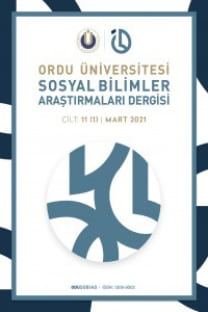Türk Kültürü Yusuf Has Hâcib’e Neler Borçludur?
Karahanlılar, Yusuf Has Hâcib, Kutadgu Bilig, Siyasetnâme, Kün-Toğdı
What Owes the Turkic Culture to Yusuf Khass Hajib?
Qarakhanids, Yusuf Khass Hajib, Kutadgu Bilig, Political Treatise, Küntogdi,
___
- Adalıoğlu, H. H. (Güz 2013). "Bir Siyasetname Olarak Kutadgu Bilig", Selçuk Üniversitesi Türkiyat Araştırmaları Dergisi, S. 34, 237-253.
- Ağca, F. (2014). “Türkistanlı Bir Bilge: Yusuf Has Hacip”. Türk Dünyası Bilgeler Zirvesi: Gönül Sultanları Buluşması. 26-28 Mayıs 2014. Eskişehir 2013 Türk Dünyası Kültür Başkenti Ajansı (TDKB). s. 79-88 (http://bilgelerzirvesi.org).
- Altay, A. (Summer 2011). “Klâsik Dönem Osmanlı Siyasetnâme Geleneğine Genel Bir Bakış”, Turkish Studies, Volume 6/3, s. 1795-1809.
- Aristoteles, (1993). Politika, Terc. Mete Tuncay, İstanbul: Remzi Kitapevi.
- Caferoğlu, A. (1984). Türk Dili Tarihi I-II, İstanbul: Enderun Kitabevi.
- Demirtaş, A. (2004). “Kutadgu Bilig’deki Hükümdar Küntogdı Tipine Göstergebilimsel Açıdan bir Yaklaşım Denemesi”, TÜBAR, XV, s. 161-174.
- ISSN: 1309-9302
- Yayın Aralığı: Yılda 3 Sayı
- Başlangıç: 2010
- Yayıncı: -
Tahmasb–Hümayun İttifakında Şiilik’in Rolü
Türk Kültürü Yusuf Has Hâcib’e Neler Borçludur?
Bölgesel Kalkınmada Kümelenme Yaklaşımı; Bayburt İli’ndeki Arıcılık Sektörü Üzerine Bir Uygulama
TURGUT BAYRAMOĞLU, YILMAZ ONUR ARİ, ATAKAN DURMAZ
Sağlık İletişimi Çerçevesinde Çevrimiçi Destek Grubu İşlevi: ‘‘Böbrekle Hayat Bulanlar’’
Hüseyin KARA, Yusuf KARAKILÇIK
Bir Kamu Hastanesinde Hasta Memnuniyetinin Ölçülmesine Yönelik Bir Araştırma
Mustafa NAL, Ergün HASGÜL, Burcu NAL
Alman Borsalarında İşlem Gören Alternatif Enerji Firmalarının Fiyatlarına Etki Eden Faktörler
ŞAHNAZ KOÇOĞLU, CİHAN TANRIÖVEN
Frigya Bölgesi’nde Bizans Dönemi Kaya Mimarisi
Hizmet Kalitesinin Servqual Analizi ile Ölçümü: Kahramanmaraş İlinde Bir Uygulama
